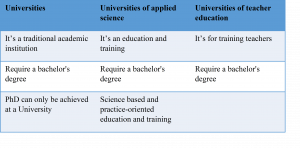My name is Viviana. I’m from Cartagena, Colombia, a city famous around the world for its beautiful people, culture and colourful historic streets. I have also lived in three other places that I once considered home. After I finished high school, I became a mother in Tampa, Florida. Later, had my first job experiences and fell in love with crabs in Baltimore, Maryland and then moved to the cold, but beautiful Canada where I enjoyed breakfast with maple syrup and for some reason started using “eh” when speaking in English. Some years ago, after obtaining my bachelor’s degree I came to know Switzerland through my husband who inspired me to do more research into where to continue my education. In 2018 I started my Masters program in Switzerland. It has been a journey full of amazing experiences that I’d like to share with you all here.
You may have heard of Switzerland for being home to Roger Federer, its famous Victorinox knives, Lindt chocolate, the Alps, cheese, luxury watches or the many memes that compare your country with Switzerland hehe… Beyond all of that, Switzerland is also famous for its top-ranked universities where famous people have studied, such as Albert Einstein, le Corbusier, British historian and biographer Sir Alistair Horne, Johann Heinrich Pestalozzi and many others.
This beautiful country has four official languages: German, French, Italian and Romansh. But most of its people have a working knowledge of English that makes it easier for foreigners to communicate. When it comes to higher education, universities are focused deeply on theoretical study and research many programs, but there are many programs taught in English where foreign students have also the option to work, generally around 15 hours per week earning between 20 to 27 Swiss Francs per hour.
There are three kinds of institutions for higher education:

Here you will find some steps I followed during the research and application process:
- Look at the different degrees and programs offered. Universities offer a variety of degrees, diplomas and certificates, some of which include Executive Master of Business Administration (EMBA), Master in Business Administration (MBA), Master of Science (MSc), Master of Arts (MA), Diploma of Advanced Studies (DAS), Certificate of Advanced Studies (CAS). It’s necessary to know the differences between each one in order to choose the most appropriate for you.
In addition, universities have different offerings for students, such as the option to do an exchange semester abroad, a dual degree and a broad range of free language courses.
- Analyse the university where the program is offered. Check the methodology of study, amount of modules, the program overview and lecture curriculum. Find here a list of Swiss Universities
- Identify if you meet the requirements. In the case of postgraduate courses, it’s important to have a bachelor’s degree equivalent to 180 ECTS (European Credit Transfer System) that is used with the Bologna process, making sure that the education obtained can be accredited from one place to another. The most common requirements include having excellent grades, international language accreditation, writing a motivational letter, etc. In some cases, an exam must be taken but that depends on the chosen university.
In the case of the international language accreditation, the most common exams that are accepted worldwide are the IELTS and TOEFL . The required scores can also vary by university, but it’s usually an equivalent to C1 or C2. No less than that.
- Research the costs. Prices vary, so it’s important to check if the university is public or private. From my own experience, public universities are usually lower in cost, but also take into account the expenses for living in Switzerland.
- Look into scholarships. Some universities might offer scholarships. It’s never a bad idea to inquire, but also find out if some scholarships are offered in your home country too. Check here for possible options.
- Fill out the application. Make sure to follow the guidelines of the application and to do it before the deadline. Take into consideration that in some countries the process of translating and getting apostilles takes some time.
- Apply for a loan in your home country (if necessary). In some cases students don’t have the amount of money needed to live abroad during the time of their studies, so it’s important that you research about the different loans available in your country, check the requirements and do it far enough ahead of time before starting the visa process.
- Prepare for the interview. In some cases, an interview is the last step. Thus, if you have any questions about the program, this is the best moment to ask them.
- Apply for the student visa after receiving the notification of acceptance. Make sure everything is in order to avoid any delays.
- Start inquiring about accommodation, tickets and health insurance. The best time to do this is during the visa process.
- You are ready to start your new journey! When everything is ready, I recommend that you read about the culture in Switzerland, the country’s customs and how to attend different events to meet other students and locals.
I hope you find these steps helpful when applying to a Swiss university. I will be writing weekly about different aspects like what you’ll need to know when studying in Switzerland, how is the culture, where to travel, tips for saving money and so much more.
Let me know if there is anything else you would like to know about living and studying in Switzerland. Until next week…
The Ranking of National Higher Education Systems ( UNIVERSITAS 21 – 2019)



Very informative post, thank you!
Thanks Gabi!